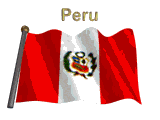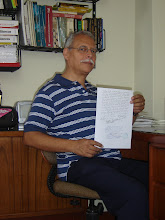Peru Could Pay Off Agriculture Reform Bonds This Year - Min
![]()
LIMA -(Dow Jones)- Peru's government hopes to be able to resolve a long outstanding issue over unpaid bonds before the term of President Alan Garcia ends in late July, a high-level government official said.
The "Agriculture Reform Bonds" are held by many former landowners, as well as by domestic and foreign banks and investment funds. The bonds were issued about 40 years ago by the military government of General Juan Velasco as compensation for expropriated land.
Resolving the long-standing issue of the unpaid bonds should help Peru protect its investment grade debt rating.
Various bondholders and some banks, including Peru's Banco de Credito, have started legal actions against the government in order to force it to honor the bonds.
Finance Minister Ismael Benavides said that the nonpayment of the bonds has hurt Peru's image, and that a proposal could be sent to Congress in April.
"This (the nonpayment) could hurt Peru's investment grade rating or it could lead to an embargo being placed on funds that are held in the exterior. It is a theme that we have to resolve and what we are doing is putting together information in order to make a proposal to Congress," Benavides said in an interview with television station Canal N, a transcript of which was released by the finance ministry Wednesday.
When asked if resolving the issue would be left to the following government, Benavides said, "No. I think we can do it now."
Benavides said that there is a estimate of the amount outstanding on the bonds of about 4.0 billion soles. ($1.44 billion)
Thousands of Peruvians were issued the paper with 20, 25 and 30-year maturities, denominated in soles de oro.
Some of the bonds were redeemed, while the state's Banco de la Nacion holds others. In 1984 the state-owned Agricultural Bank that serviced the debt closed. The next year the sol de oro ceased to exist, replaced first by the inti, and then later by the nuevo sol, the current currency.
Benavides said that the government is collecting information on the bonds. No central registry exists of who the bondholders are.
Benavides said that any payment on the bonds could be made by issuing longer-term instruments that would be negotiable. He mentioned bonds that could be used to invest in undeveloped state-owned land.
Benavides said that among the foreign bondholders are UBS and Bank of America. U.S-based emerging market investment fund, Gramercy, has also bought some of the bonds.
-By Robert Kozak, Dow Jones Newswires; 511-99927 7269; peru@dowjones.com
(END) Dow Jones Newswires
03-02-11 1323ET
Read more: Peru Could Pay Off Agriculture Reform Bonds This Year - Min - Investing - Dow Jones Newswire - SmartMoney.com http://www.smartmoney.com/news/on/?story=on-20110302-000498#ixzz1GQHT1qzq




